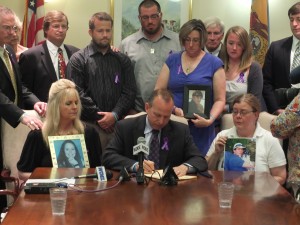New laws expand access to substance abuse treatment, remove insurance barriers, and strengthen oversight of prescriptions
WILMINGTON, Del. – Governor John Carney on Tuesday signed into law Senate Bill 41, House Bill 91, and House Bill 100, a bipartisan package of legislation that will expand access to substance abuse treatment, strengthen oversight of opioid prescriptions, and combat Delaware’s addiction crisis.
Governor Carney signed the legislation during a ceremony that included remarks from Attorney General Matt Denn, members of the General Assembly, and Delaware advocates for improved access to substance abuse treatment – including families who have lost loved ones to Delaware’s opioid epidemic.
“Far too many Delawareans, and Delaware families, have been affected by this crisis,” said Governor Carney. “These new laws represent a significant step forward in our efforts to combat Delaware’s addiction epidemic. To the Delaware families who have lost loved ones to addiction, and who are now fighting to prevent others from experiencing the same fate, your work is nothing short of inspiring. To the Delawareans who are using your own experience with substance abuse to help others, know that you are making a difference. We will continue to follow your lead. Thank you to Attorney General Denn and members of the General Assembly for your continued urgency on this issue.”
“The credit for these bills should go to the Delawareans who have overcome substance abuse, and the families who lost loved ones to drug overdoses, who stepped forward and shared their thoughts about where the system was failing and how it could be improved,” said Attorney General Matt Denn. “We listened and tried to turn their suggestions into laws, but the ideas came from those families, and after giving us the ideas they stood shoulder to shoulder with us to make sure the bills were passed.”
“I truly feel that every life matters,” said MaryBeth Cichocki, who lost her son to opioid addiction, and advocated for the new laws. “We are all one injury or surgery away from the disease that continues to take the lives of those we love. As long as I breathe, Matt will continue to live.”
“We are gr ateful for all those responsible for the passing of these bills,” said Don Keister, a founder of atTAcK Addiction, whose son lost his battle with addiction. “When families need help, it’s important that services are available without additional delays. If these laws had been around when our son was battling this disease, he may still be alive today.”
ateful for all those responsible for the passing of these bills,” said Don Keister, a founder of atTAcK Addiction, whose son lost his battle with addiction. “When families need help, it’s important that services are available without additional delays. If these laws had been around when our son was battling this disease, he may still be alive today.”
Legislation signed into law on Tuesday will take a number of steps to expand access to substance abuse treatment, target barriers to insurance coverage, and improve Delaware’s response to the addiction epidemic.
The package will:
• Prevent private insurers from using pre-authorization and referral requirements to delay access to substance abuse treatment;
• Require insurance companies to cover 14 days of substance abuse treatment before conducting a “utilization review” that can delay treatment;
• Limit insurance companies from denying substance abuse treatment based on “medical necessity” grounds;
• Allow the Department of Justice to use consumer protection funds to advocate for those being denied coverage based on “medical necessity” grounds;
• Establish a new committee to help oversee opioid prescriptions, and strengthen the oversight of over-prescription.
“Even with limitless support, battling addiction is incredibly difficult. But it shouldn’t be made harder by insurance companies and health care providers standing in the way of critical treatment,” said Senate Majority Leader Margaret Rose Henry, the lead Senate sponsor of House Bill 100. “I am grateful to Governor Carney for signing this important legislation into law, so Delawareans never again have to worry about whether they’re covered by insurance before seeking substance abuse treatment that could save their lives.”
“Delawareans who take the initiative to seek treatment for substance abuse shouldn’t have to wade through red tape to get the help they need,” said Senator Stephanie Hansen, the prime sponsor of Senate Bill 41. “I appreciate the Attorney General’s leadership in helping us pass this important legislation, which ensures that insurance companies are forbidden from imposing pre-certifications, screenings, prior authorizations or referrals for those ready to make the potentially life-saving decision to get help.”
“In light of the scourge of addiction, we need to get these people appropriate treatment, when it’s needed,” said Senator Dave Lawson. “Current coverages are insufficient.”
“These measures are necessary first steps towards addressing the needs of a significant portion of the more than 90,000 Delawareans currently suffering from addiction. We mustn’t fail to provide safety-nets for those in need of immediate treatment, and we must work to ensure current policies align with the increasing needs of Delawareans affected by addiction,” said Senator Anthony Delcollo. “Lastly, we cannot continue to operate in a vacuum when addressing addiction, and I am committed to working with my colleagues to aggressively pursue solutions to improve the lives of almost 100,000 Delawareans affected by this horrific disease.”
“If people struggle and stumble as they seek treatment, they should have the ability to come back and get treated again. Addiction is a disease, just like cancer and diabetes, and should be considered as one when it comes to medical treatment. Delawareans struggling with addiction should be extended a helping hand when they seek treatment, not have the door shut in their faces,” said Representative Helene Keeley, the prime  sponsor of House Bill 100. “These combined efforts provide us with the necessary resources to battle the opioid epidemic in the First State and remove the stigma associated with substance abuse.”
sponsor of House Bill 100. “These combined efforts provide us with the necessary resources to battle the opioid epidemic in the First State and remove the stigma associated with substance abuse.”
“These bills will help save lives in Delaware and I am proud to be part of this effort to combat the disease of addiction. Substance abuse treatment helps people reintegrate into society and lead productive lives,” said Representative Michael Mulrooney, the prime sponsor of House Bill 91. “If we deny people suffering from substance abuse the treatment they need, it can lead them to relapse and either end up in the criminal justice system or worse.”
“This package of legislation represents best practices that we are implementing in Delaware in order to strategically address our concerns in battling the heroin and opioid epidemic,” said Representative Ruth Briggs King. “And, we are not done yet. Other bills, such as the substance-exposed infant legislation is working its way through Legislative Hall and should be our next primary focus in this ongoing effort to combat this epidemic.”
“These bills are key to fighting the opioid epidemic in Delaware because they address a very important component of this process – making sure adequate treatment is available to those who need it,” said Representative Tim Dukes. “Without access to treatment, all our efforts may as well be considered for nothing.”
“Collectively, these bills also add to the public awareness that addiction is a disease, that it can be treated, and people do recover,” said Dr. Kara Odom Walker, Secretary of the Department of Health and Social Services. “With addiction, we know that when people are ready for treatment, the window can be small in terms of connecting them to that critical care. At the Department of Health and Social Services, we will do everything in our power to connect that person to the treatment they seek.”
###
Related news:
Delaware to Participate in NGA’s Bipartisan Health Reform Learning Network
DHSS Relaunches ‘Help is Here’ Website with Accompanying Prevention, Treatment, and Recovery Support Campaign





